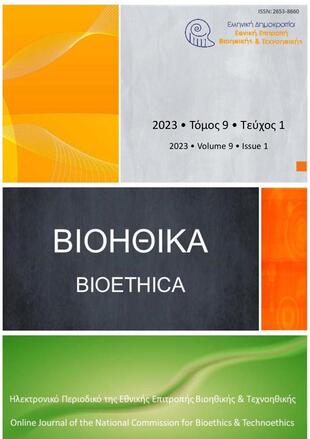Η Βιοηθική διάσταση της καθημερινότητας των ατόμων με άνοια: από την αυτονομία αποφάσεων έως την φροντίδα για το μέλλον
Abstract
Η άνοια θέτει μια πρόκληση για την ορθή κρίση και την αυτονομία των ατόμων, ενώ υποσκάπτει την ποιότητα ζωής τους. Τα ηθικά ζητήματα αντιμετωπίζονται από τα ίδια τα άτομα με άνοια, τους φροντιστές τους και τους παρόχους υγειονομικής περίθαλψης σε καθημερινή βάση. Αυτά εκτείνονται σε ένα ευρύ φάσμα, το οποίο περιλαμβάνει όχι μόνο τα σοβαρά ζητήματα για τις αποφάσεις στο τέλος της ζωής, αλλά και τα απλά καθημερινά προβλήματα, όπως η οδήγηση. Η διεπιστημονική προσέγγιση των βιοηθικών ζητημάτων αναδεικνύει την άνοια ως σημαντικό και πολύπλευρο κοινωνικό φαινόμενο. Οι αλλαγές στις γνωστικές ικανότητες και τις καθημερινές δραστηριότητες επηρεάζουν τις διαπροσωπικές αλληλεπιδράσεις και τις οικογενειακές σχέσεις. Οι ασθενείς, το περιβάλλον τους και οι κλινικοί ιατροί καλούνται σε ένα νέο πλαίσιο να συνεργάζονται για να λάβουν αποφάσεις σχετικά με τη διαγνωστική διαδικασία, την καθημερινή διαβίωση, τον συντονισμό της φροντίδας, τον εκ των προτέρων προγραμματισμό της ή τις παρεμβάσεις στο τέλος της ζωής. Οι στενές σχέσεις μεταξύ ηθικής και δικαίου είναι διαχρονικές, καθιστώντας απαραίτητη την παράλληλη μελέτη των ηθικών ζητημάτων με τη νομοθεσία.
Article Details
- Come citare
-
Λυγνός Δ., & Ρεθυμιωτάκη Ε. (2023). Η Βιοηθική διάσταση της καθημερινότητας των ατόμων με άνοια: από την αυτονομία αποφάσεων έως την φροντίδα για το μέλλον. Bioethica, 9(1), 6–21. https://doi.org/10.12681/bioeth.34071
- Fascicolo
- V. 9 N. 1 (2023): Bioethica
- Sezione
- Original Articles

TQuesto lavoro è fornito con la licenza Creative Commons Attribuzione 4.0 Internazionale.
Authors who publish with this journal agree to the following terms:
- Authors retain copyright and grant the journal right of first publication with the work simultaneously licensed under a Creative Commons Attribution CC BY 4.0 License, which allows for immediate free access to the work and permits any user to read, download, copy, distribute, print, search, or link to the full texts of articles, crawl them for indexing, pass them as data to software, or use them for any other lawful purpose. Appropriate credit must be given by citing the author(s) and the original publication in this journal.
- Authors are able to enter into separate, additional contractual arrangements for the non-exclusive distribution of the journal's published version of the work (e.g. post it to an institutional repository or publish it in a book), with an acknowledgement of its initial publication in this journal.
We encourage authors to deposit their articles, as well as data underlying the publications, in institutional and/or other appropriate subject repositories.
Bioethica permits and encourages authors to archive the final publication pdf in institutional (e.g. the repository of the National Hellenic Research Foundation) or other appropriate subject repositories (e.g. SSOAR repository for social sciences), in compliance with institutional and/or funder open access policies, after publication in the BIOETHICA. Authors must provide bibliographic details that credit publication in the journal, as well as related funding details (when applicable).
Lists of institutional and other subject-based academic open access repositories can be found listed by country at the registry http://opendoar.org/countrylist.php
If your institution does not possess a repository you may deposit a copy of your paper at no cost with www.zenodo.org , the repository supported for open access research in the EU by the European Commission, through the project OpenAIRE (www.openaire.eu )



